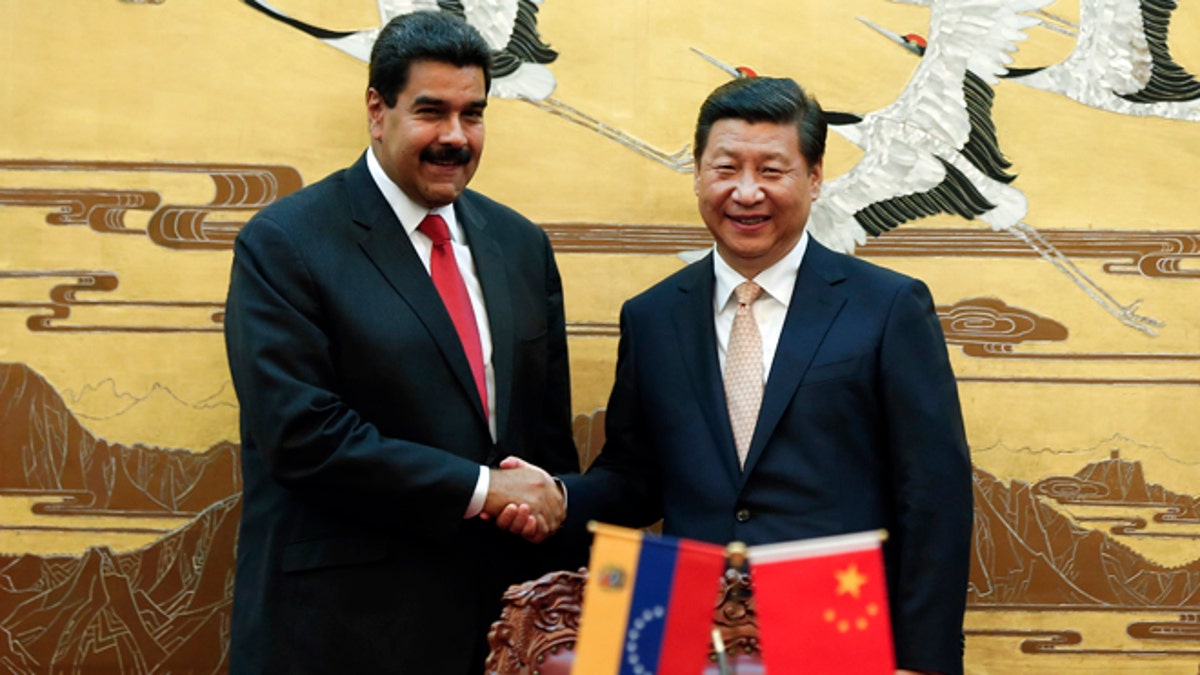
Presidents Xi Jinping and Nicolas Maduro in Beijing Sunday, Sept. 22, 2013. (AP2013)
To listen to the current Venezuelan government talking about the United States, you might think that a squad of CIA agents is just waiting to seize President Nicolás Maduro on a street corner in Manhattan, where he is attending the United Nations General Assembly meeting.
Following unsubstantiated claims last week that the U.S. closed its airspace to Maduro's plane as he flew to China, Venezuelan Foreign Minister Elias Jaua has written to the UN Secretary-General, Ban Ki Moon, demanding "guarantees that we are going to be respected by the government of the United States." Jaua also said that the State Department had denied visas to members of the Venezuelan delegation heading to the UN – an allegation firmly denied in Washington.
Venezuela supplies China with 600,000 barrels of oil per day, a figure that could increase to one million barrels if China is able to transform Venezuela's corrupt and chronically mismanaged oil industry.
These outbursts of hatred toward the U.S. are to be expected from the Venezuelan regime, which has accused the Americans of all sorts of conspiracies in the last few months, from assassinating the late President, Hugo Chávez, to plotting the shortage of basic goods like cooking oil and toilet paper which is currently plaguing the country.
There is some purpose behind these accusations. Maduro is looking for a great power ally and he thinks he's found one in China.
Maduro's trip to China last week came just days after the Venezuelan government announced a $14 billion deal with the China National Petroleum Corporation for a project to develop the Junín 10 block in Venezuela's Orinoco region, an area that holds one of the largest oil reserves in the world.
Over the last decade, Venezuela's relations with China have grown warmer at all levels. When he served as Venezuela's foreign minister under Chávez, Maduro assiduously cultivated China's ruling communists, regarding them as both an ideological and an economic ally. After the United States, China is Venezuela's biggest trade partner, and Venezuela has become the main destination for Chinese investment in Latin America.
Maduro and those loyal to him are fond of presenting the relationship with China as integral to the country's socialist orientation. Yul Jabour, the president of the Venezuelan parliament's Foreign Policy Committee, trumpeted Maduro's Beijing visit as essential for the well-being of the "Bolivarian revolution." Alongside China, Jabour named Russia, Iran and Belarus as countries with whom Venezuela enjoys a fruitful relationship. Interestingly, Cuba, which receives a colossal $8 billion worth of subsidised oil from Venezuela each year, didn't make it onto Jabour's list of friends.
Regardless, what all these countries have in common is that they are run by authoritarian regimes. Following the widely disputed presidential election in April of this year, in which Maduro held onto power after refusing a recount, Venezuela has steadily been developing the features of a more traditional dictatorship. As that tragic process continues, Maduro has come to understand that he needs allies who share his view of the world, but who won't bleed the country's resources – as Cuba does – at the same time.
China has consistently proved its willingness to invest first in Chávez and now in Maduro. As a result, Venezuela supplies China with 600,000 barrels of oil per day, a figure that could increase to one million barrels if China is able to transform Venezuela's corrupt and chronically mismanaged oil industry. Make no mistake, that will be an uphill task: before Chávez became president in 1999, PDVSA, Venezuela's national oil company, was producing 3.5 million barrels of oil per day. Almost fifteen years later, that figure has collapsed to 2.7 million barrels.
For strategic reasons, the Chinese are willing to play with an element of risk. With U.S. President Barack Obama reorienting American foreign policy to east Asia – famously known as the "pivot" – China perceives important opportunities in America's backyard.
For democracy advocates in Venezuela, the relationship with China is deeply unsettling. It weds our country to a regime whose contempt for human rights is well-known, and where corruption is rampant. Maduro already has enough bad habits of his own without learning more from his Chinese friends.
Additionally, we worry that decisions on partnerships are being made on ideological rather than practical grounds. Chinese petroleum companies are coming to Venezuela not because they offer the best deals and resources, but because Maduro regards President Xi as the best hope for the anti-American forces in the world today.
That same desire to shun America disturbs us for many reasons, foremost that the U.S. remains our largest trading partner. But that relationship is becoming jeopardized. Two years ago, PDVSA was caught supplying oil to Iran, in violation of U.S. sanctions. As a consequence, PDVSA can no longer compete for U.S. government contracts or secure U.S. financing. Given that the U.S. imports $18 billion of goods from Venezuela annually, for Maduro to risk this vital revenue in the name of ideology is criminally negligent.
During the Venezuelan opposition's presidential campaign earlier this year, the opposition pro-democracy candidate, Henrique Capriles, stressed that as an oil-rich country with an educated population, Venezuela should conduct its foreign trade, whether with China or the United States, as an equal, not as a subordinate. But under Chávez and now Maduro, our country has been robbed by Cuba and compromised by China and Russia. And there is no end in sight.
